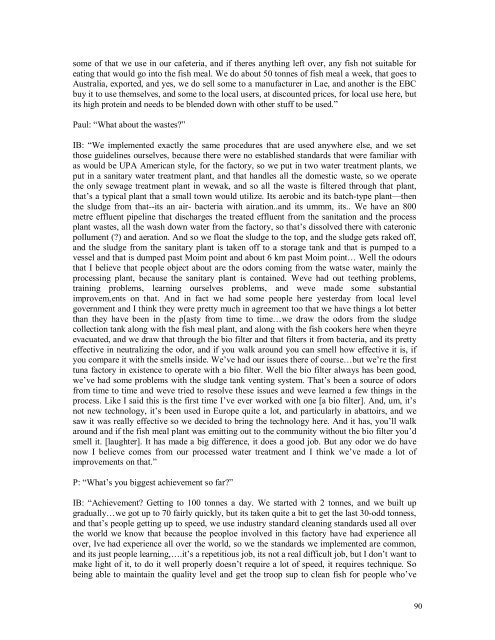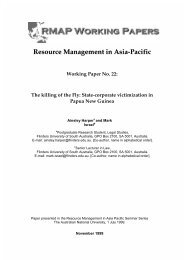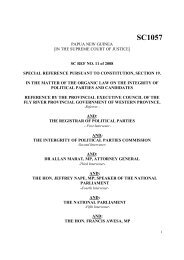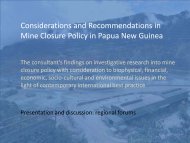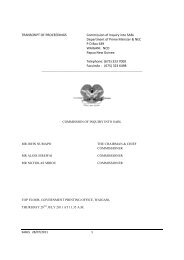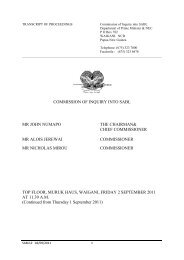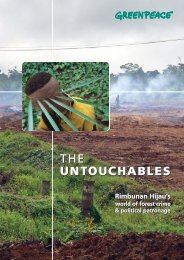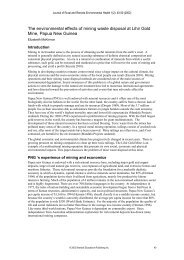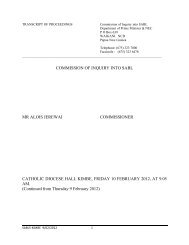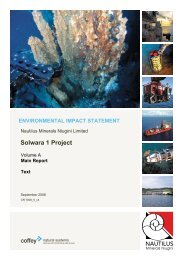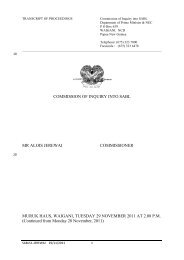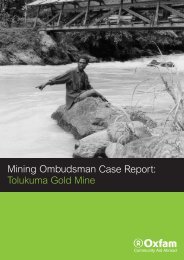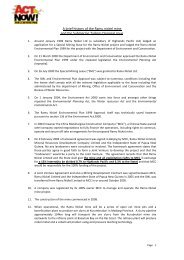some <strong>of</strong> that we use in our cafeteria, and if theres anything left over, any fish not suitable foreating that would go into the fish meal. We do about 50 tonnes <strong>of</strong> fish meal a week, that goes toAustralia, exported, and yes, we do sell some to a manufacturer in Lae, and another is the EBCbuy it to use themselves, and some to the local users, at discounted prices, for local use here, butits high protein and needs to be blended down with other stuff to be used.”Paul: “What about the wastes?”IB: “We implemented exactly the same procedures that are used anywhere else, and we setthose guidelines ourselves, because there were no established standards that were familiar withas would be UPA American style, for the factory, so we put in two water treatment plants, weput in a sanitary water treatment plant, and that handles all the domestic waste, so we operatethe only sewage treatment plant in wewak, and so all the waste is filtered through that plant,that’s a typical plant that a small town would utilize. Its aerobic and its batch-type plant—thenthe sludge from that--its an air- bacteria with airation..and its ummm, its.. We have an 800metre effluent pipeline that discharges the treated effluent from the sanitation and the processplant wastes, all the wash down water from the factory, so that’s dissolved there with cateronicpollument (?) and aeration. And so we float the sludge to the top, and the sludge gets raked <strong>of</strong>f,and the sludge from the sanitary plant is taken <strong>of</strong>f to a storage tank and that is pumped to avessel and that is dumped past Moim point and about 6 km past Moim point… Well the odoursthat I believe that people object about are the odors coming from the watse water, mainly theprocessing plant, because the sanitary plant is contained. Weve had out teething problems,training problems, learning ourselves problems, and weve made some substantialimprovem,ents on that. And in fact we had some people here yesterday from local levelgovernment and I think they were pretty much in agreement too that we have things a lot betterthan they have been in the p[asty from time to time…we draw the odors from the sludgecollection tank along with the fish meal plant, and along with the fish cookers here when theyreevacuated, and we draw that through the bio filter and that filters it from bacteria, and its prettyeffective in neutralizing the odor, and if you walk around you can smell how effective it is, ifyou compare it with the smells inside. We’ve had our issues there <strong>of</strong> course…but we’re the firsttuna factory in existence to operate with a bio filter. Well the bio filter always has been good,we’ve had some problems with the sludge tank venting system. That’s been a source <strong>of</strong> odorsfrom time to time and weve tried to resolve these issues and weve learned a few things in theprocess. Like I said this is the first time I’ve ever worked with one [a bio filter]. And, um, it’snot new technology, it’s been used in Europe quite a lot, and particularly in abattoirs, and wesaw it was really effective so we decided to bring the technology here. And it has, you’ll walkaround and if the fish meal plant was emitting out to the community without the bio filter you’dsmell it. [laughter]. It has made a big difference, it does a good job. But any odor we do havenow I believe comes from our processed water treatment and I think we’ve made a lot <strong>of</strong>improvements on that.”P: “What’s you biggest achievement so far?”IB: “Achievement? Getting to 100 tonnes a day. We started with 2 tonnes, and we built upgradually…we got up to 70 fairly quickly, but its taken quite a bit to get the last 30-odd tonness,and that’s people getting up to speed, we use industry standard cleaning standards used all overthe world we know that because the peoploe involved in this factory have had experience allover, Ive had experience all over the world, so we the standards we implemented are common,and its just people learning,….it’s a repetitious job, its not a real difficult job, but I don’t want tomake light <strong>of</strong> it, to do it well properly doesn’t require a lot <strong>of</strong> speed, it requires technique. Sobeing able to maintain the quality level and get the troop sup to clean fish for people who’ve90
never cleaned fish before, that was a challenge. But Im very impressed with the ability <strong>of</strong> thelocal ladies to learn this.“Complaints? We’ve had from time to time, employing 1200 to 13000 people every day, we’veterminated many people, people who have been found to have betelnut on their possession,there’s a rule no betelenut in the factory and no chewing betelnut in the factory. People continueto bring it in, and they get terminated when they get caught. People get disciplined. We’ve hadpeople complain about their pay. How much they earn. First thing: how many days did youwork? First thing, and they talk to other outsiders and they say, ‘What-- you only earn thatmuch money?’ But what the person is not telling them is that they didn’t show up for work twodays in a fortnight. And like I said with the absenteeism, people don’t understand, or it’s taken along time to understand that they’re paid by the hour. We have a base rate, we have a startingrate, we have a rate after the probationary period, and then we have rates for other levels <strong>of</strong>--forteam leaders, the supervisors, the forklift drivers, the maintainence people, so we have a payscale, and everybody that shows up ten doys out <strong>of</strong> the ten day period they get an additionalattendance bonus in their pay packet.”N: “How long is probationary period?”IB: “<strong>The</strong> standard 3 months. <strong>The</strong>n it goes to regular rate, and then we pay a shift differential, fordifferent hours, so the night shift is paid more…anybody that’s on the night shift gets apremium per hour in addition to that. What we also do is give our employees the opportunity totransfers, at the end <strong>of</strong> every month they have the opportunity to change shifts if they sodesire…so the second shift people can come to the first, and so forth.“Safety? That’s a good question. <strong>The</strong> majority <strong>of</strong> our workers are female and weve designed ourshifts and the length <strong>of</strong> our shifts around the daylight hours. We start the day shift---see localtransport here---we do not want to be in the transport <strong>business</strong>, we do not want to take the<strong>business</strong> away from the local operators. <strong>The</strong> local operators don’t want to operate outside <strong>of</strong> 6oclock at night and 6 oclock in the morning. For security reasons. We wouldn’t want to be anydifferent from them, we have the same security problems. We designed our shifts around thosehours and what we do is we have a standard 8 hour shift, on the day shift, and the night shiftstarts at 6 oclock at night., which means they can get in while transport is operating and the dayshift can get home, and we do an extra two hours. Of overtime, they get paid overtime, for thattime, which brings them closer to that day shift, 6 AM, so they can get home. That extends thenight shift on and puts them at a time when they can pick up the transportation.”N: “You provide a meal?”IB: “We provide with no charge to the employees if they so desire to eat it, its not compulsory,a meal, we <strong>of</strong>fer a meal, I get a lot <strong>of</strong> criticism because I think a lot <strong>of</strong> people think it’s thesustaining meal for the day, but it’s a meal that’s <strong>of</strong>fered by the factory for employees if theychoose to.”N: “Some bring their own lunch?”IB: “<strong>The</strong>y’re quite welcome to do that. We’ve gone backwards and forwards on the meal, welisten to a lot <strong>of</strong> complaints on the meal, and weve had complaints from time to time and we’vetried tin fish and we tried sago.“We’re starting to have some employee meetings on a monthly basis, where we don’t selectthem, but employees meet with management and HR and hopefully well start to get some <strong>of</strong>91
- Page 1 and 2:
Fishy BusinessThe social impact of
- Page 3 and 4:
4. Townspeople and market women 158
- Page 6 and 7:
More to the point, the contract for
- Page 8 and 9:
‘development’ projects will be
- Page 10 and 11:
whole concept of MSY; the problem o
- Page 12:
noted most reasonably that the skil
- Page 16 and 17:
• That landowners groups be encou
- Page 18 and 19:
This project adopted an open protoc
- Page 20 and 21:
public figures who had seen RD Tuna
- Page 22 and 23:
suddenly costs the government more
- Page 24 and 25:
problems of the poor.’ He pledges
- Page 26 and 27:
scores of landowner groups who regi
- Page 28 and 29:
areas…There were promises of new
- Page 30 and 31:
might say today. This is certainly
- Page 32 and 33:
During the 1950’s over 860,000 co
- Page 34 and 35:
of reorientation of focus and direc
- Page 36 and 37:
But it is the provincial government
- Page 38 and 39:
title, sensu the Windjammer, is ‘
- Page 40 and 41: Blue Water Tuna is a private PNG co
- Page 42: 9.5.05: The Bismark Fishing Company
- Page 45 and 46: The two landowning clans of Parom g
- Page 47 and 48: ilong mi na long tingting bilong ol
- Page 49 and 50: ol set ups, say olsem 20 or 30 set
- Page 51 and 52: No contact or awareness with Marien
- Page 53 and 54: Los Angeles, CA 90021USATel: 1-800-
- Page 55 and 56: meters out from its original size,
- Page 57 and 58: The Offshore Masters is going to be
- Page 59 and 60: I am not aware of any Environmental
- Page 61 and 62: “Based on the 970 local labour re
- Page 63 and 64: Water Resources Act (Chapter No. 20
- Page 65 and 66: The 26 Local Level Governments in t
- Page 67 and 68: people were made to believe that ne
- Page 69 and 70: Nianguma, so the leaders of the 8 c
- Page 71 and 72: 3. That there was a totally unbeara
- Page 73 and 74: p10:p12:73
- Page 75 and 76: p.14:75
- Page 77 and 78: . Marine Ripples articleThe followi
- Page 79 and 80: In general, I feel SSTC has present
- Page 81 and 82: •how the tuna factory development
- Page 83 and 84: Responses to Consent Condition Exce
- Page 85 and 86: “Sometimes while working we are t
- Page 87 and 88: fisheries myself at one stage and f
- Page 89: N: “Have you sponsored sporting g
- Page 93 and 94: IB: “Oh sure, but somebody’s go
- Page 95 and 96: Philomena Naura: “The smell aroun
- Page 97 and 98: There is no covering to the oxidizi
- Page 99 and 100: Above: four consecutive pay slips f
- Page 101 and 102: Above is a list of curses said to b
- Page 103 and 104: duties on one of the ships offloadi
- Page 105 and 106: on the side of the fishing vessel.
- Page 107 and 108: The fishery observer told us that i
- Page 109 and 110: Speaking of prostitution on fishing
- Page 111 and 112: and if any major disruptions occur
- Page 113 and 114: Most of us here are very unfortunat
- Page 115 and 116: The husband of the woman employed a
- Page 117 and 118: Thomas Nigints was one of the few p
- Page 119 and 120: Did SST place FADs in the sea?The c
- Page 121 and 122: doing it, it’s going to be over o
- Page 123 and 124: Landowners are also deeply disturbe
- Page 125 and 126: places or settlement where they are
- Page 127 and 128: in the revenue, so when the opportu
- Page 129 and 130: And as soon as they’d finished th
- Page 131 and 132: There is no legal case as yet with
- Page 133 and 134: owns the land legally and therefore
- Page 135 and 136: There is still need to recruit more
- Page 137 and 138: In regard to the production, by the
- Page 139 and 140: The company invited interested peop
- Page 141 and 142:
strategy is very well used by forei
- Page 143 and 144:
employees and those whose work requ
- Page 145 and 146:
The present Human Resource Manager
- Page 147 and 148:
working gear? In my section I wear
- Page 149 and 150:
working for a whole first week with
- Page 151 and 152:
Serah from Manam island, married wi
- Page 153 and 154:
stret long mipela ol mama husait I
- Page 155 and 156:
The supervisors in the plant/engine
- Page 157 and 158:
The color of the sea has changed. F
- Page 159 and 160:
Donald Jacob, Catrans fuel distribu
- Page 161 and 162:
Kapmandu Service station. Did South
- Page 163 and 164:
Three women involved with roadside
- Page 165 and 166:
export processing zones and then in
- Page 167 and 168:
When we asked if this meant sportin
- Page 169 and 170:
then men’s. Usually they’re exc
- Page 171 and 172:
The WWF consultant also notes that
- Page 173 and 174:
of a company like SST cannot be pla
- Page 175 and 176:
East Sepik Governor Arthur Somare s
- Page 177 and 178:
The cost of the project is between
- Page 179 and 180:
The National Shipping Page, 1.6.04W
- Page 181 and 182:
that have similar fish factory set-
- Page 183 and 184:
Infofish website : PNG: Tuna export
- Page 185 and 186:
Post-Courier 20.6.05185
- Page 187 and 188:
Did your application form ask you a
- Page 189 and 190:
Do you know whether the Provincial
- Page 191 and 192:
The Provincial AdministratorDept. o
- Page 193 and 194:
4. Human Resources registerees, Kew
- Page 195 and 196:
195
- Page 197 and 198:
Under Spin-Off Business Activities
- Page 199 and 200:
Finally, Honourable Ministers, Memb
- Page 201 and 202:
The adverse non-immune (toxic) and
- Page 203 and 204:
low income) will have an impact in
- Page 205 and 206:
ed and pink plastic roses are every
- Page 207 and 208:
207
- Page 209 and 210:
Tuna fisheriesThe management system
- Page 211 and 212:
• Monitor interactions between th
- Page 213 and 214:
Programme is expanding this program
- Page 215 and 216:
This office recommends that, since
- Page 217 and 218:
commercial industry still deny any
- Page 219 and 220:
219
- Page 221 and 222:
221
- Page 223 and 224:
REPORTER: If you come and you put t
- Page 225 and 226:
Berman, M. 1997. Faust, the First D
- Page 227 and 228:
Lutkehaus, N., C. Kaufman, W.E. Mit


